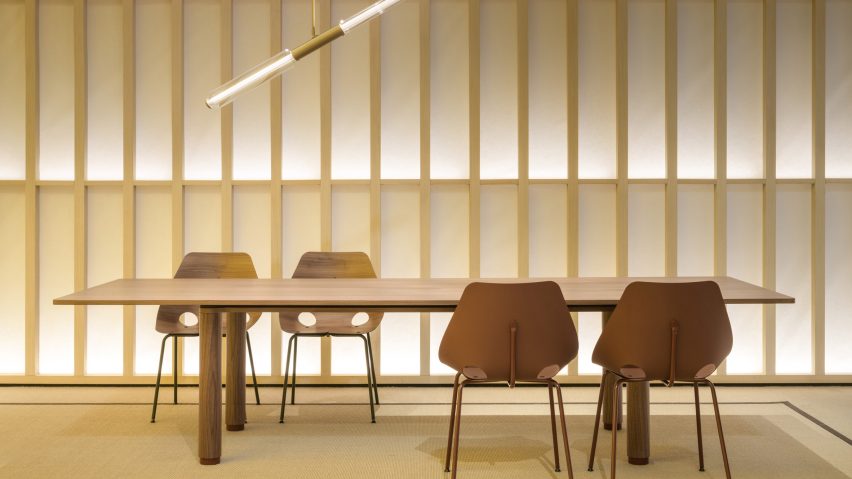
Ten launches from Milan that explore the future of furniture design
Biodegradable stools and a dining table that discretely turns into a desk are among Dezeen editor-at-large Amy Frearson's picks of the most progressive furniture launches at this year's Milan design week.
Furniture brands were launching new products and collections all over Milan, with some exhibiting at the Salone del Mobile furniture fair and others in showrooms and venues dotted around the city.
A few stood out for how they addressed sustainability challenges, with newly developed materials and innovative assembly methods resulting in products with a reduced carbon footprint.
Some addressed challenges relating to diversity within the design industry, while others explored how advances in technology are changing our relationships with objects.
Read on to discover 10 key examples:
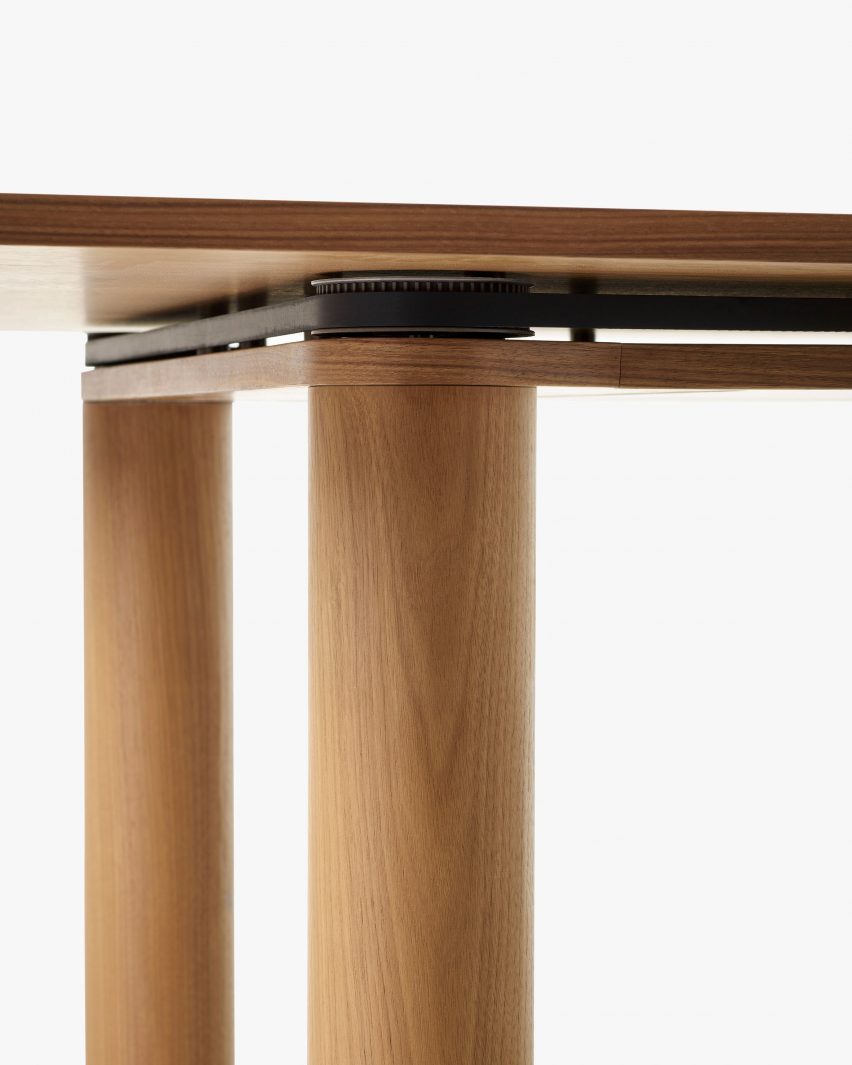
A discretely height-adjustable table
Nastro by Daniel Rybakken for Alias
With remote working still the norm for many, Norwegian designer Daniel Rybakken has devised a dining table that can be easily adjusted to instead function as a seated or standing desk.
Launched at the Salone del Mobile by Italian brand Alias, the Nastro table features a concealed belt-and-pulley mechanism that allows the surface to be raised or lowered by hand without any need for electricity.
A video posted on Instagram by Rybakken reveals how easy it is to adjust.
"At the lowest height, the table's unique features are not revealed at all, making it ideal for the home – from dining at the lowest height, to cooking food and drinks at medium height, to working with a laptop at the highest height," said the designer.
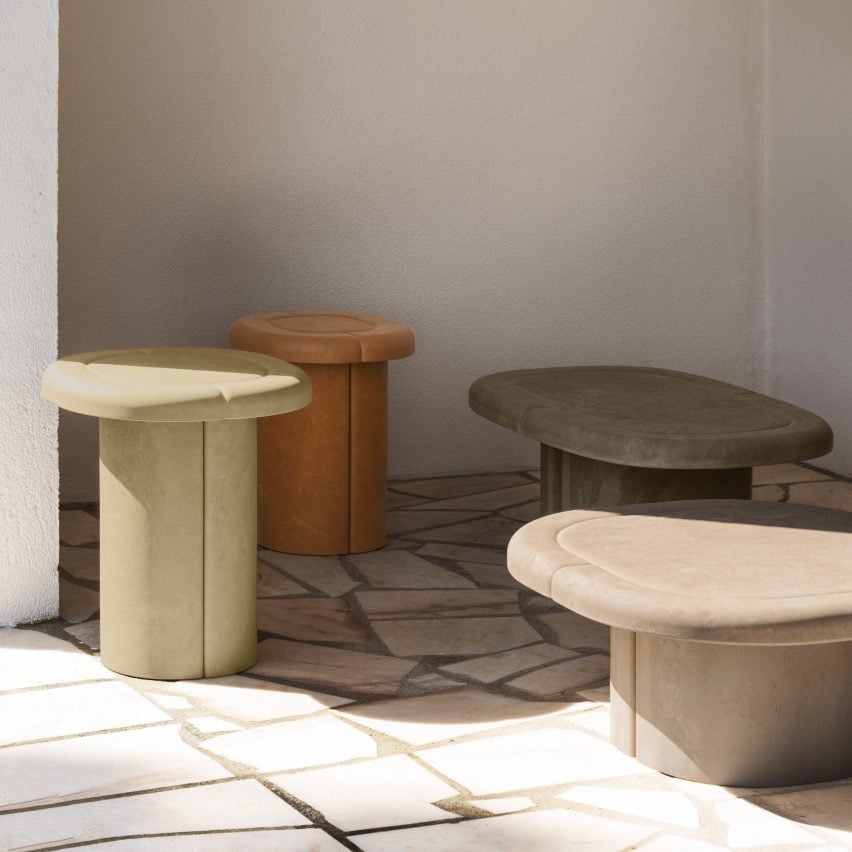
Biodegradable furniture in an array of colours
Alder by Patricia Urquiola for Mater
Danish brand Mater has become known for its patented material, Matek, which combines waste plastic with biomaterials such as sawdust and coffee bean shells.
The brand has now developed a biodegradable blend of this heat-pressed material, thanks to the use of a bioplastic made from sugarcane. Spanish designer Patricia Urquiola has turned this into a collection of tables and stools that come in colours including terracotta and sandy yellow.
"Biodegradable plastic, in this case sugar cane, is a rapidly renewable source that can be harvested 1-2 times a year," said Ketil Årdal, CEO of Mater.
"It naturally absorbs carbon dioxide while growing and can be decomposed by living organisms in the same way as wood or any other natural material."
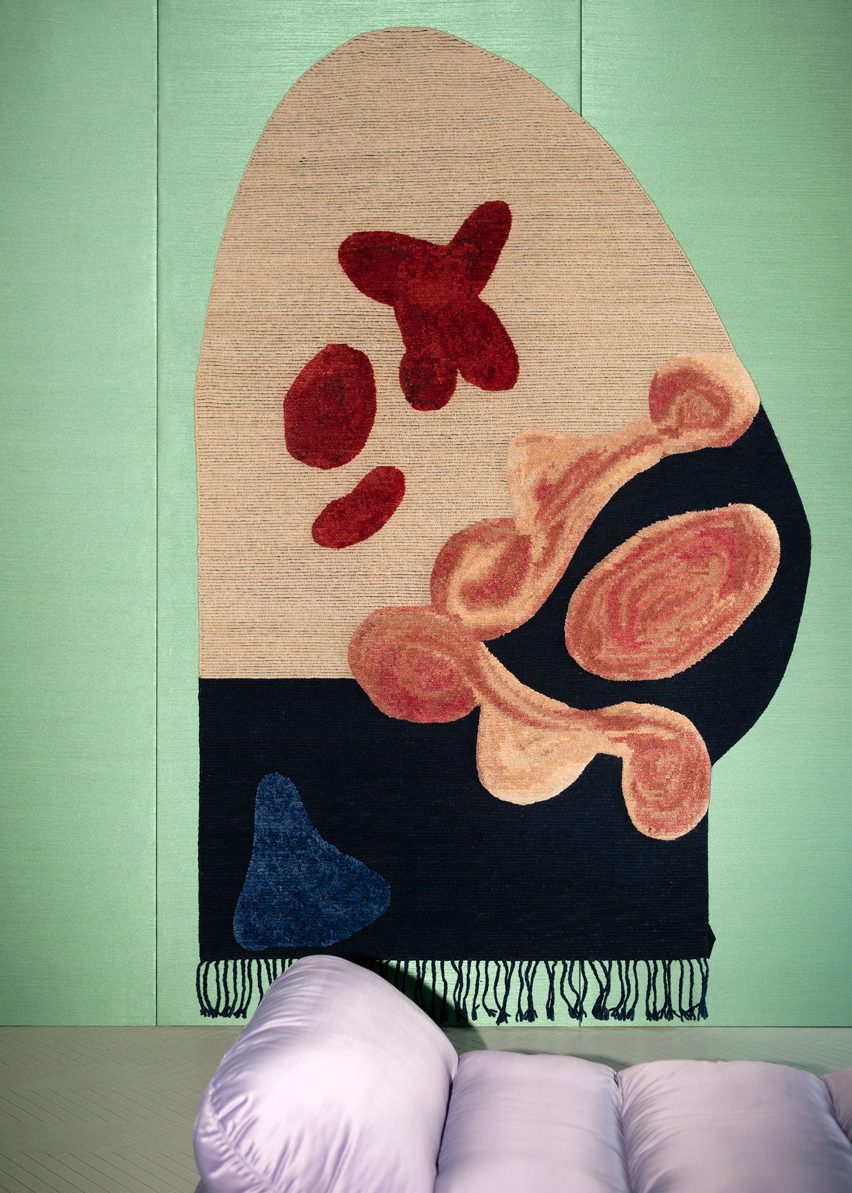
Rugs that embrace female identity
Rude Collection by Faye Toogood for CC-Tapis
Of the many products that British designer Faye Toogood unveiled in Milan, the most provocative was a range of rugs she unveiled with Italian brand CC-Tapis in her Rude Arts Club exhibition.
Featuring abstract images of male and female body parts, alongside blood-red blobs, these multi-textural carpets celebrate sex and the human form from a female perspective.
Toogood told Dezeen that she wanted to celebrate female energy and womanhood in a way that is seldom seen in the design industry.
"It's a kind of expression of the human body – male, female, everyone – but also the sexual energy that is a big part of being human," she said.
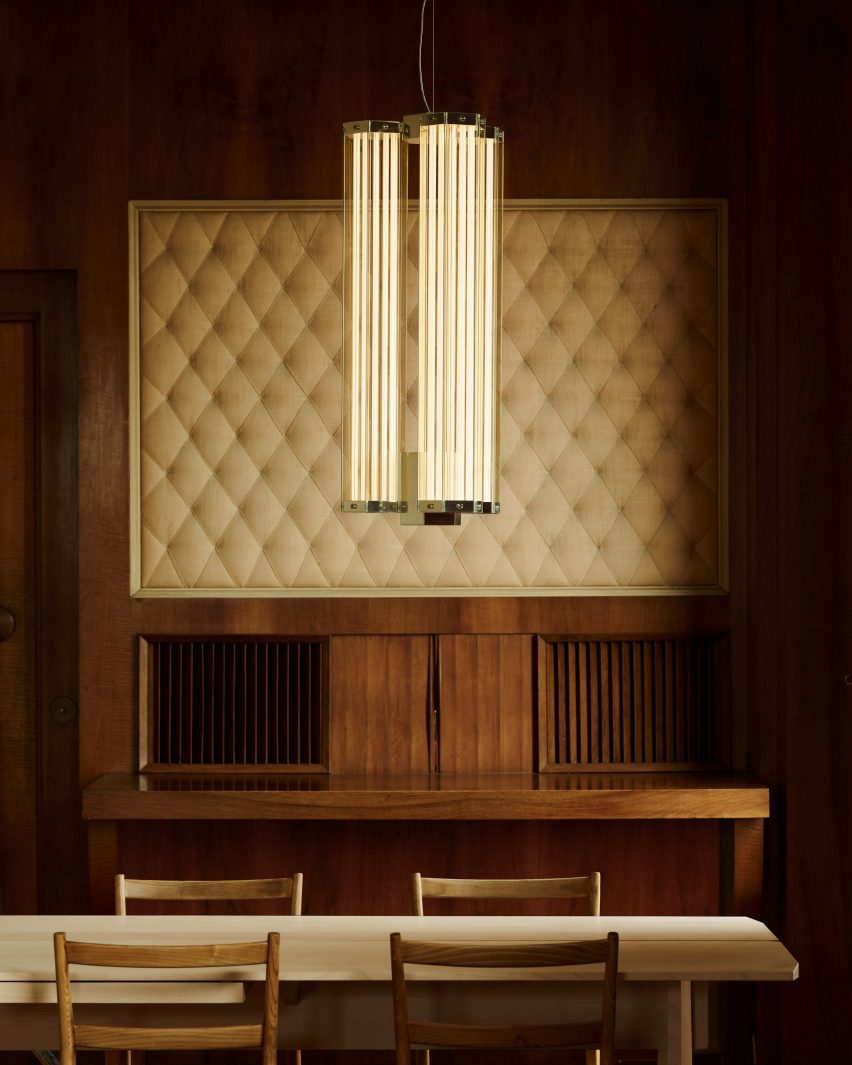
Lamps containing an innovative LED strip
Superwire by Formafantasma for Flos
Italian lighting brand Flos has developed a new type of LED light source, a thin and flexible strip that emits warm and homogeneous light across lengths of up to one metre.
By encasing this strip inside hexagonal glass tubes, Italian design duo Formafantasma has produced a collection of lamps featuring flawless light stripes of different widths.
Andea Trimarchi and Simone Farresin of Formafantasma said the project "represents a change of pace in LED lighting".
"The filament obtained is, to all intents and purposes, a new light source with great potential which we will certainly use in the future," said the pair.
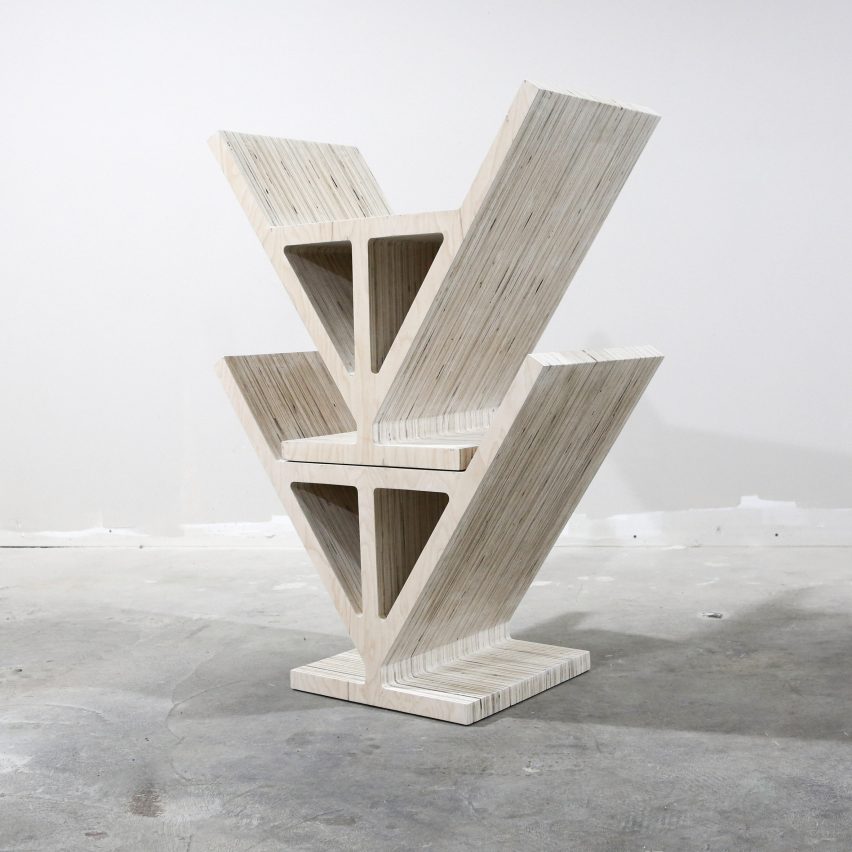
A stool referencing West African culture
Euclid Stool by Limbo Accra
At a time when diversity is still sorely lacking in the design industry, New York- and Ghana-based studio Limbo Accra brought a West African perspective to Milan as part of the Prada Frames symposium.
The polished and lacquered plywood Euclid Stool combines references to unfinished architecture with Euclidean geometry, exploring notions of what it means to be "in limbo". Limbo Accra is self-producing the stool in a limited edition.
"We are always searching, pushing forward towards the unknown and the unseen," said studio founders Dominique Petit-Frère and Emil Grip.
"The stool represents explorations that allow us to think about the realm of limbo in new ways and inspire us to continue searching."
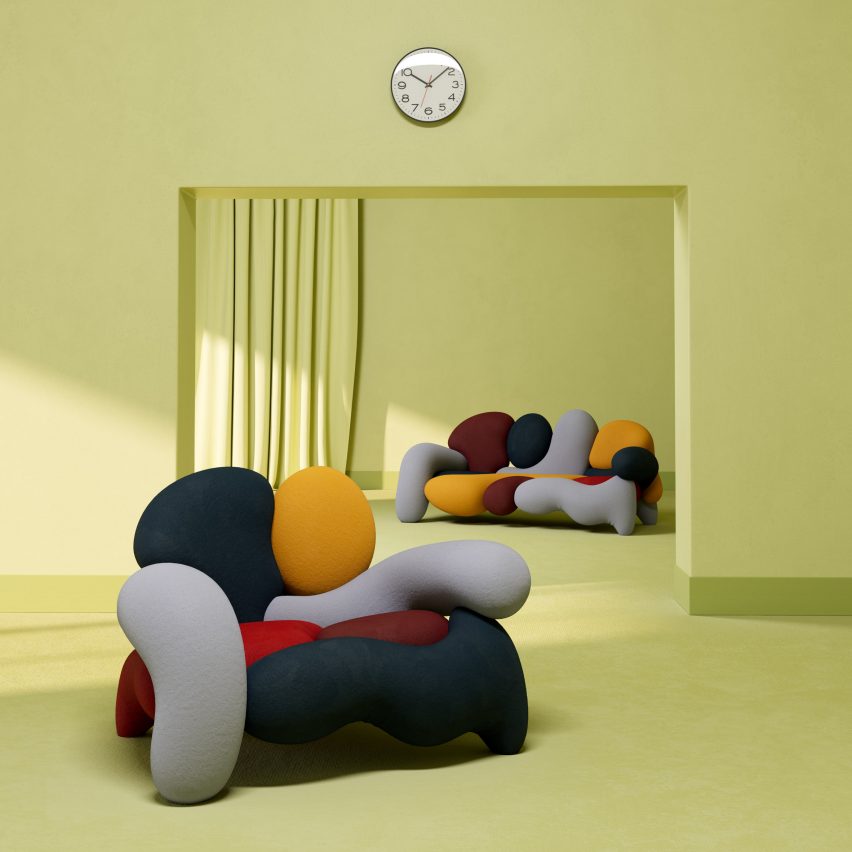
Seating that explores a new approach to radical design
Morphologica by Misha Kahn for Meritalia
American artist Misha Kahn has pushed furniture manufacturing to the limit with this design for Meritalia, an Italian brand best known for producing the irreverent designs of figures such as Gaetano Pesce and Mario Bellini.
Exploring what it means to be radical today, Kahn developed a sofa and armchair combining an assortment of irregular bulbous shapes, all based on forms found inside the human body.
Kahn describes it as a "shocking coach", while Meritalia calls it "sexy more than playful".
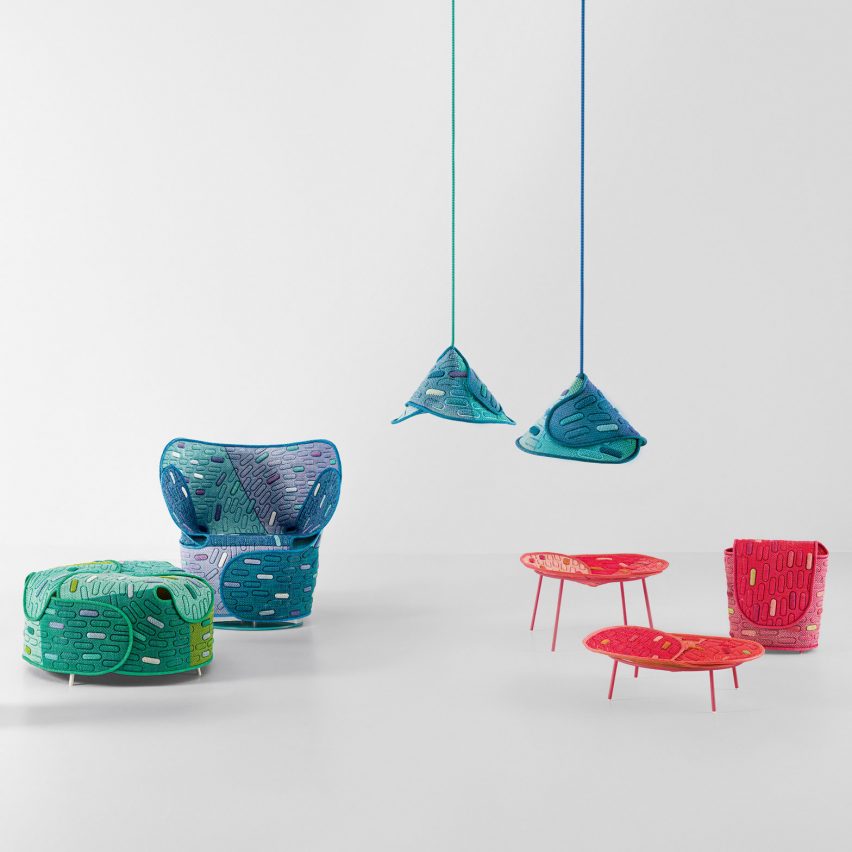
Furniture produced with a fabric-first approach
Hana-arashi by Nendo for Paola Lenti
Leftover fabrics and offcuts from Paola Lenti's outdoor furniture products provided the starting point for this range of furniture designed by Japanese studio Nendo.
The project represents a departure for Nendo founder Oki Sato, who is more used to working with an object brief than experimenting with a recycled material.
The resulting collection is more colourful than Nendo's typically pared-back, monochromatic aesthetic. The recyclable polypropylene textiles are steam-bent to create objects with playful curves, colours and overlap details.
"We sandwiched the material in wax paper and then ironed it," Sato told Dezeen. "By controlling the pressure and heat, we noticed that it became a semi-solid fabric. That was the 'aha'-moment."
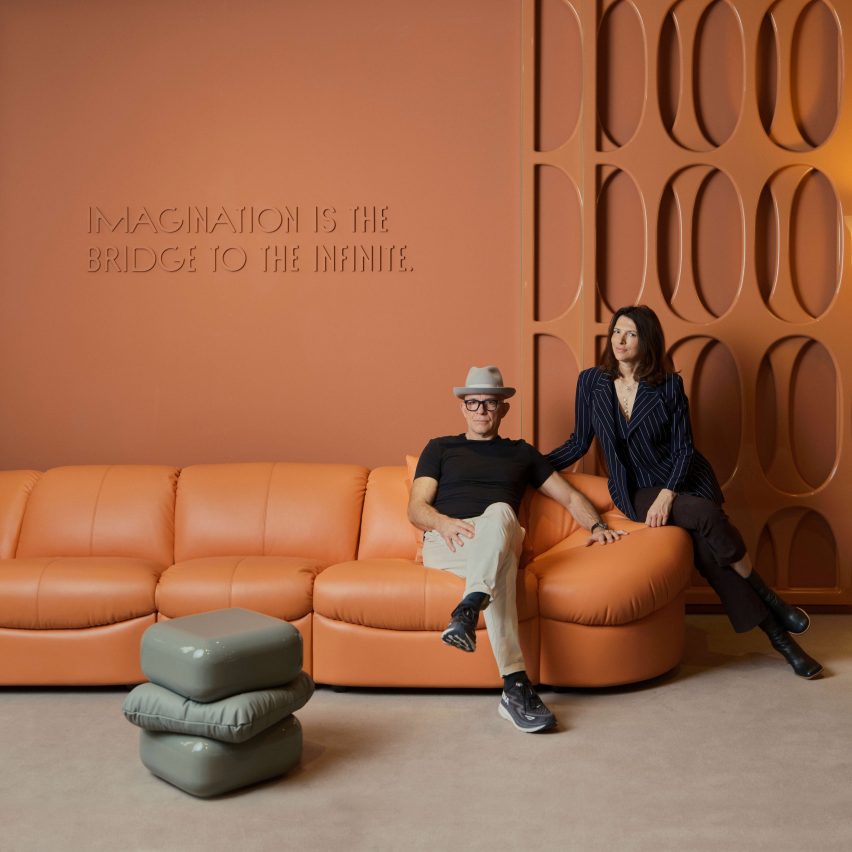
A sofa that nods to 1990s streetwear
Parka by Draga & Aurel for Poltrona Frau
While many designs in Milan this year paid tribute to the glamour and excess of the 1970s, Italian studio Draga & Aurel showed how furniture could lean into the casual-cool aesthetic of the 1990s.
Produced by Italian manufacturer Poltrona Frau, the sofa reinterprets the squishy padding and hooded shape of the ubiquitous jacket in soft cushion-like leather upholstery.
"The unusual elliptical shape of the backrest, which inclines to become an armrest and then a seamless seat, creates a concave or convex space that is both audacious and welcoming," said the brand.
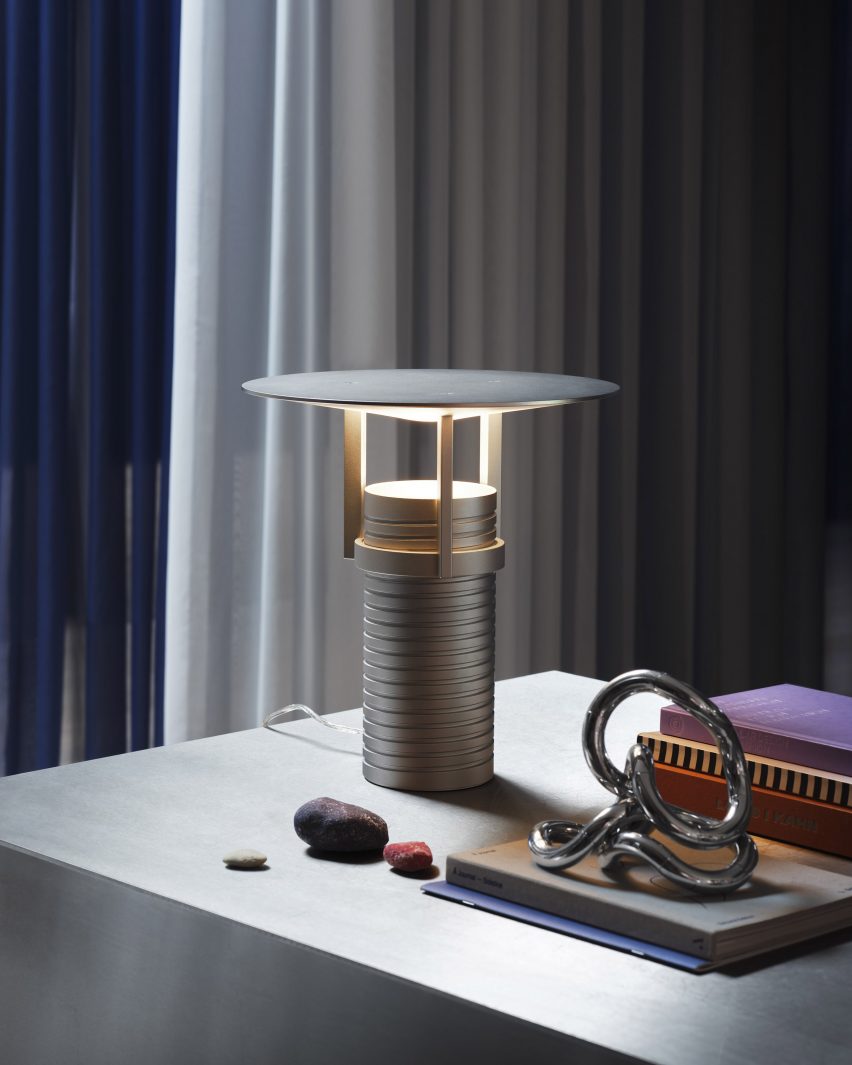
An intuitive table lamp made from aluminium
Set Lamp by Jamie Wolfond for Muuto
There were many examples of aluminium products on show in Milan this year, as the material becomes increasingly popular as a more recycle-friendly alternative to plastic. One of the most well-resolved was a table lamp by emerging Toronto-based designer Jamie Wolfond, for Danish homeware brand Muuto.
Designed as a giant screw, the lamp effectively communicates how to adjust the height of its shade. You simply spin this circular element to move it up or down.
"I think you need recognisable elements to communicate with people in the same way that if you’re verbalising something to someone, you have to use language they can understand," said Wolfond.
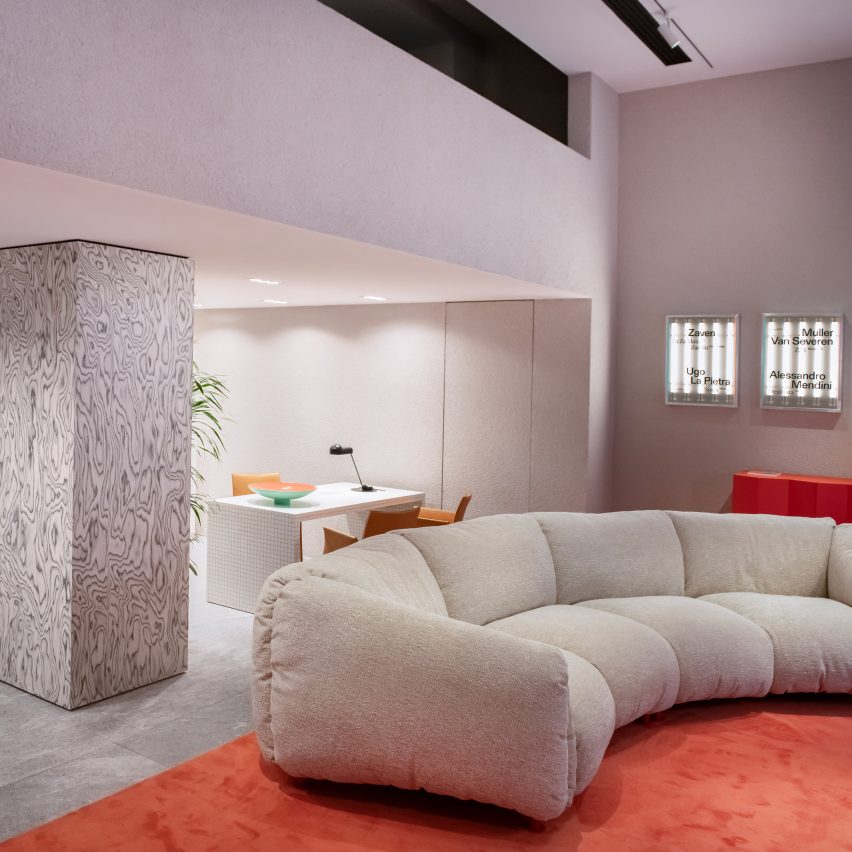
Furniture stuffed with recycled plastic
ZA:ZA by Zaven for Zanotta
Italian brand Zanotta is one of many furniture producers exploring ways of manufacturing sofas without upholstery foam or glue, to make them more eco-friendly.
This solution, developed with Venetian studio Zaven, is instead formed of cushions that are stuffed with recycled polyester balls and strapped in place over a metal frame.
Following the launch of the initial ZA:ZA sofa in 2023, Zanotta has expanded the range with modular elements that allow for multiple configurations. A ZA:ZA bed was also introduced.
Milan Design Week took place from 16 to 21 April. See Dezeen Events Guide for more architecture and design events around the world.